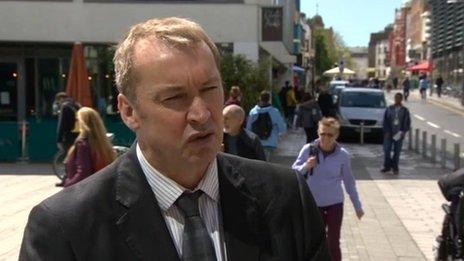Brighton and Hove drug-use rooms 'time not right'
- Published

Drug-use rooms will not be piloted in Brighton but could still open in the future, the city's Independent Drugs Commission has said.
Proposals had been put forward for the UK's first drug consumption room (DCR) to open in the city, allowing people to use illegal drugs under supervision.
A working group found it could meet the needs of some drug users but not those of the overall local community.
Commission vice-chair Mike Trace said the time was not right to pilot a DCR.
But he said the work undertaken could be used when making a decision on the scheme at a later date.
"Although, after careful consideration, the response by the working group was that the time is not right to pilot a drug consumption room in the city, we believe the detailed feasibility study undertaken will ensure a strong evidence-base to inform decision-making on whether a local DCR should be deployed in the future," he said.
'Legal factors'
Brighton Pavilion MP Caroline Lucas had asked Brighton's Safer in the City Partnership to set up the commission to look at drugs problems in the city in 2012.
She said: "What the Safer in the City Partnership has done is looked at whether or not they think that that particular intervention in the city at this time would make enough difference.
"They've decided on balance it probably wouldn't.
"But they've also said that the legal situation is one of the factors that was in their minds when they came to that conclusion."
Decriminalised consumption rooms are in use in Germany, Luxembourg, the Netherlands, Spain, Norway, Switzerland, Canada and Australia.
The commission, which released its final conclusions on Tuesday, made several other recommendations which are being implemented.
Those included a call for more training for people to be able to administer a life-saving overdose antidote, more services for people who had mental health problems and drug addiction, and also separate services for younger people and adults so younger users do not mix with more established users.
According to the commission, an estimated 60,255 people in Brighton and Hove have used illegal drugs - 36% of adults.
The most popular illegal drug was cannabis, but there was also widespread use of heroin, cocaine and amphetamines.
A study in 2010 identified just over 2,000 heroin and cocaine users in the city who could be problem drug users, because they were dependent, or had health or social problems or were committing drug-related crime.
Brighton saw 50 drug-related deaths in 2009, which fell to 20 in 2011 and 16 in 2012.
- Published24 February 2014
- Published30 October 2013
- Published30 October 2013
- Published18 April 2013
- Published18 April 2013